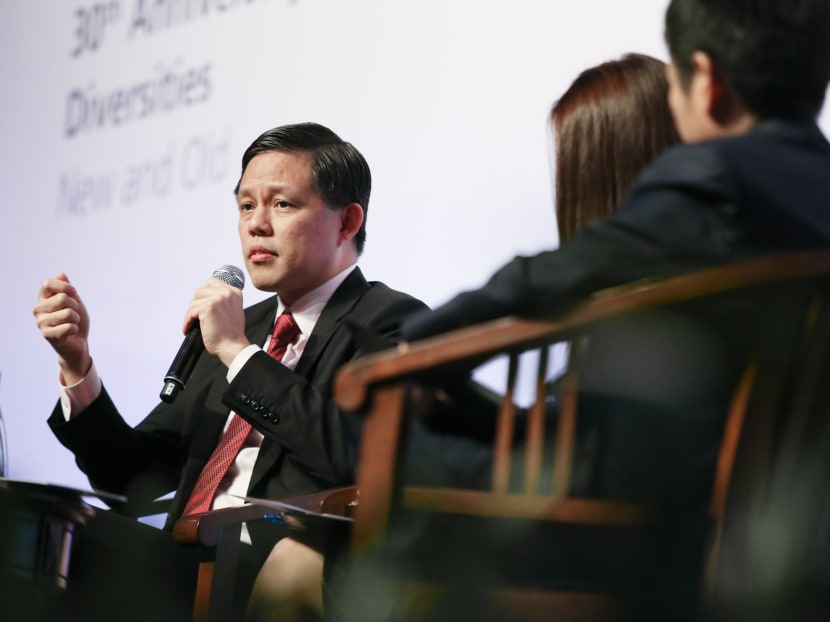There is a difference between elites and those with elitist attitudes: Chan Chun Sing
SINGAPORE — Amid a global mood of disenchantment towards the elites, Trade and Industry Minister Chan Chun Sing cautioned that a distinction must be made between elites who give back to society, and those with elitist attitudes who have closed themselves off from the rest of society.

Trade and Industry Minister Chan Chun Sing at the closing panel discussion at a conference marking the 30th anniversary of local think tank, Institute of Policy Studies (IPS).
SINGAPORE — Amid a global mood of disenchantment towards the elites, Trade and Industry Minister Chan Chun Sing cautioned that a distinction must be made between elites who give back to society, and those with elitist attitudes who have closed themselves off from the rest of society.
During a dialogue at a public policy conference on Friday (Oct 26), Mr Chan said there is currently a narrow definition of the term “elite”, which holds many negative connotations.
He added: “To be successful and rise up is not elitism. To be successful and not reach out is elitism.”
There is also a difference between being “anti-elitism and anti-excellence”, he said. “Anti-elitism” means being disenfranchised by those who have done well in life, not through effort but their connections or family background, and who do not reach out to the rest of society, said Mr Chan.
“If I have succeeded and done well in this system, but contribute to society and touch lives of people, then is it fair to also similarly bunch everybody together, and say you are all elites?” he asked.
Pointing to himself, he then questioned whether he should be categorised as an elite now that he is a Minister. “Yes”, replied another panelist Ms Chua Mui Hoong, to laughter from the audience. Ms Chua is the opinion editor at The Straits Times.
She added that Mr Chan is “a member of the political elite” and “academic aristocracy”, and that he is elite “by virtue of income and education”.
Replying in jest, Mr Chan said: “So, the fact that I've worked hard and grew up in a single-parent family, that no longer matters. The fact that I have 'arrived' makes me an elite, and therefore I should be subject to all these perspective, accusations.”
Responding to criticism that Singapore is governed by elites, he said that though it might “sometimes (be) comforting to pigeonhole people into certain groups”, it would lead to people losing sight of an individual’s contribution and talent.
He added: “I agree if the group is monolithic and uncaring, by all means call them elites and bash them up. But if the group succeeded and come from diverse background? Don’t pigeonhole people into groups that we find comfortable to do so.”
Sweeping generalisations of people are also unfair and unnecessary, said Mr Chan. He recounted a visit to Anglo-Chinese School (Independent) where a few students said they have been mocked by others, and called elitist.
“Is that fair? Let’s pause for a moment. We hardly know the individual but we have branded them,” Mr Chan said in the closing panel discussion at a conference marking the 30th anniversary of local think tank, Institute of Policy Studies (IPS).
LEND A HELPING HAND
In recent months, there have been ongoing discussions on the issue of inequality, with Government leaders speaking about it in Parliament, as well as at the IPS conference.
Mr Chan said that conversations on the issue have been “one-dimensional”, focusing solely on the income aspect. But it is important not to assess an individual’s worth, and to discriminate this person based on his or her income, education, and family background.
Another key factor that should be considered is whether the system allows every Singaporean to fulfill his or her potential, he added.
As for his own childhood, Mr Chan said that he and his sister were raised by their mother in a three-room flat after his parents’ divorce. There were instances where he was looked down upon, because he did not “speak the way they speak”.
Though the Government may try to reduce the inequality gap, there are natural forces at play. The rich will marry among themselves, and will pass on their wealth and privileges to the next generation, he added.
In older societies, there is a lower probability for those at the bottom to rise up, he said.
Singapore should not end up in such a situation even as its society matures, as it will lead to a scenario where “people won’t feel there’s a stake and won’t realise their potential”, he noted.
He urged Singaporeans, especially the rich, to lend a helping hand and be more conscious of the needy. “Those who have succeeded must know they have the responsibility to help (other) Singaporeans,” said Mr Chan.
“If we abide by that spirit, I am confident Singapore will grow from strength to strength.”
Providing examples from his personal experience, Mr Chan said he met a single mother of six children who came to his Meet-the-People session to seek help for employment, and financial assistance of S$300 through the Community Care Endowment Fund (ComCare) for lower-income households.
In contrast, there was a young couple in their 20s — who earned a combined five-figure monthly income — who expressed frustration that they had received only half of a S$20,000 grant from the Housing and Development Board.
The difference in their needs, and the way they had asked for help was a “surreal experience” for him, said Mr Chan.
He stressed that it is important to share resources with one another, and he asked if we “want to take all that we think we should have”, or if we should “leave something on the table for someone who needs it a bit more than us”.









